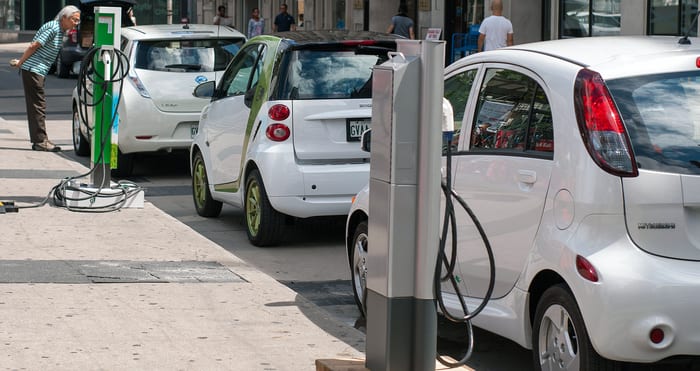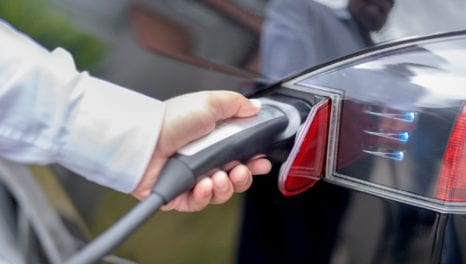Report: Ban on new petrol and diesel cars should be brought forward
The Government's 2040 targets for zero emission cars are vague and unambitious, says the Business, Energy and Industrial Strategy Committee in a report published last week (19 October).
19th October 2018 by Networks

The Electric vehicles: driving the transition report recommends the Government bring forward a clear, precise target for new sales of cars and vans to be zero emission by 2032.
The report finds that the poor provision of charging points for electric vehicles (EVs) is one of the greatest barriers to growing the UK EV market. The Committee has called on the Government to take the lead in ensuring charging points are provided nationwide and help local authorities access greater technical and financial support to develop charging infrastructure across the country, including in remote and rural areas.
Rachel Reeves MP, Chair of the Business, Energy and Industrial Strategy Committee, said: “Electric vehicles are increasingly popular, and present exciting opportunities for the UK to develop an internationally competitive EV industry and reduce our carbon emissions. But, for all the rhetoric of the UK becoming a world leader in EVs, the reality is that the Government’s deeds do not match the ambitions of their words.
“The IPCC report was clear on the need to encourage changes in consumer behaviour, including increasing the switch to electric vehicles, to help decarbonise our economy. But the UK Government’s targets on zero-emissions vehicles are unambitious and vague, giving little clarity or incentive to industry or the consumer to invest in electric cars. If we are serious about being EV world leaders, the Government must come forward with a target of new sales of cars and vans to be zero emission by 2032.
“Our EV charging infrastructure is simply not fit for purpose. We cannot expect consumers to overcome ‘range anxiety’ and switch to electric vehicles if they cannot be confident of finding convenient, reliable points to regularly charge their cars. The Government cannot simply will the ends and leave local government, or private companies, to deliver the means. The Government needs to get a grip and lead on coordinating the financial support and technical know-how necessary for local authorities to promote this infrastructure and help ensure that electric cars are an attractive option for consumers.”
The report finds that the current fiscal regime for EVs provides inconsistent messages about the Government’s ambitions for EVs and recommends that the Government align new fiscal changes with the zero emissions target. The Government should ensure buyers of electric vehicles benefit from preferential Vehicle Excise Duty rates and that the introduction of preferential rates on company car tax for EVs is brought forward without delay. The Government should also maintain Plug-in Grants for new electric vehicles at current levels, rather than cutting them from November (as announced by the Department for Transport on 11 October).
Reeves added: “The Department for Transport’s slashing of the Plug-in Grant scheme drives the incentives of buying an electric vehicle into reverse. Cutting support is a perverse way to encourage drivers to move to non-polluting cars. This is only the latest sign of the Government’s inconsistent approach to developing the market for electric vehicles. The Committee on Climate Change has made clear in their judgements on the Clean Growth Strategy and the ‘Road to Zero’ strategy that these plans do not go far enough to tackle transport emissions, putting the UK’s long-term carbon reduction targets at risk. A more joined-up and consistent approach is needed from Government if the UK is to seize the business opportunities of electric vehicles and deliver carbon emissions reductions.”
The report recognises the importance of the British car industry and the need to move ahead with the transition to electric vehicles if the automotive industry is to remain globally competitive. The report calls on the Government to work to create an attractive investment environment that will encourage manufacturers to locate new EV facilities in the UK.
Industry reaction:
Energy Networks Association chief executive David Smith said: “Our members are ready for the rollout of electric vehicles. If the deadline is brought forward, then a proactive approach is key. We want to ensure the public has access to electric vehicle charge points as quickly as possible and that the cost of connecting those charge points is kept as low as possible. Dealing with electric vehicles on a reactive basis isn’t the most efficient way of doing that.
“Local electricity networks need more information on where and when charge points are installed, along with better access to smart data and clarity on how the costs of upgrading the grid will be met, when necessary.”
A spokesman for the National Infrastructure Commission said: “With more drivers making the switch from petrol and diesel to electric cars each year, the committee are right to highlight the need for action now so that our infrastructure doesn’t dampen this growing demand.
“Through our National Infrastructure Assessment, we recommend the Government work with Ofgem and local authorities to create a truly national, visible charging network and ensure people can make the switch confident they will be able to charge their cars during or at the end of their journey – wherever in the country that is.”
Comments
Login on register to comment
Related content

Power
The future for vegetation management
Why networks should focus on data not trees to overcome the costly challenges involved in vegetation management

Power
An unprecedented opportunity for change
Why short interruptions will matter in RIIO-ED2 and how to address them.

Power
Funding for SSEN electric vehicle scheme
Innovation initiative will bring forward portable EV charging devices
Related supplier content

Power
Load patterns and lockdown: how Covid-19 is impacting electricity networks
Insights into dynamics on the low voltage network as the outbreak unfolds

Downloads
Protect electrical equipment from insulation failure
Insulation faults are a major cause leading to the eventual failure of electrical equipment. Partial discharge (PD) is a very reliable indicator of developing insulation faults. Regular PD testing allows users to detect and analyze PD activity

Heat
How E.ON. is helping the City of London become a zero emissions city
Discover Citigen. Deep in the heart of our bustling capital